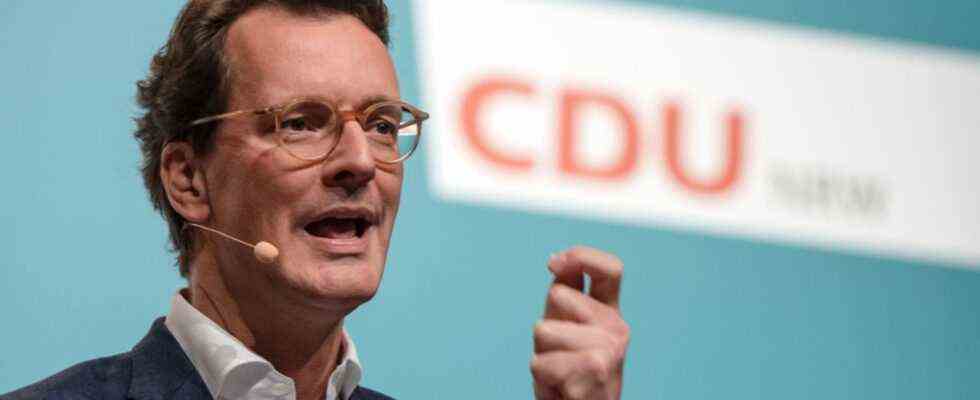NRW state parliament
Laschet successor in North Rhine-Westphalia: Wüst’s election as prime minister could be a tremendous game
If the CDU and FDP have their way, NRW Transport Minister Hendrik Wüst has already been chosen as Laschet’s successor
© Bernd Thissen / DPA
Who should replace Armin Laschet in the executive chair of the largest federal state, is determined by the CDU and FDP. However, it is not so certain whether NRW Transport Minister Hendrik Wüst will actually manage it. March through or an electoral thriller?
Political fresh start in North Rhine-Westphalia: Barely seven months before the state elections, a change in the office of Prime Minister is pending in the most populous federal state. With the still incumbent state transport minister and new CDU state chairman Hendrik Wüst, a single candidate will in all likelihood apply to succeed Armin Laschet at the head of the black-yellow coalition.
Wüst’s election victory is unlikely to be a sure-fire success
The lawyer from the Münsterland wants to become the 12th Prime Minister of the state. As a joint candidate for the CDU and FDP, he is going to the free choice for the highest government office – with just one vote majority in the state parliament, that is not a sure-fire success. Wüst sees the NRW CDU as “united, united and strong”. That was “a good tailwind for what lies ahead of us and also in front of me,” he said on Monday after a meeting of his parliamentary group.
The failed Union Chancellor candidate Laschet, who is moving to the Bundestag, has recommended Wüst as the successor to the leadership of the government, the NRW CDU and also as the top candidate for the state elections on May 15. Wüst has already announced that he wants to lead the black-yellow coalition into a new government next year.
In addition to known priorities, such as solid finances and internal security, there will also be concepts for other topics in the next few weeks, he said this week. These included rising fuel and energy prices, rental costs and property for young families.

No rival candidates in prospect
Theoretically, the opposition could also use the opportunity to send an applicant for the office of prime minister into the race. However, the SPD, Greens and AfD have not announced this.
With the wafer-thin government majority, Wüst’s election in the five-party parliament could well be a tremendous game. At least in the first ballot, he needs all 100 votes from the CDU and FDP to be elected Prime Minister in the 199-member state parliament. Possible sickness absences in the government camp could not – as in “normal” votes – be compensated for by abstaining for reasons of goodwill in the opposition camp.
If that doesn’t work, Wüst would only need one more vote of valid yes votes than no votes in a second ballot if, as expected, he remains the only candidate. It is questionable, however, whether he would go straight to a second ballot if his ranks did not immediately stand behind him. The state constitution allows a period of two weeks for this.
New elections instead of election thriller?
It would not be ruled out, however, that the coalition factions could not take the risk of an electoral crime thriller with an uncertain outcome and instead bet on new elections. The hurdle is not high: according to the state constitution, the state parliament can dissolve with a resolution of the majority of its members. That would also be tricky for the CDU, because in the latest polls it has fallen far behind the SPD (31) with just 22 percent approval.
Marginal figure in the new Bundestag: Angela Merkel in the visitors’ gallery
6 pictures
Wüst has so far not looked into the cards on the subject of the second ballot. After the CDU parliamentary group meeting on Monday, their boss, Bodo Löttgen, rushed forward to answer and said he was 100 percent sure that all the votes of the coalition groups would come together. And if even more came out of the secret election in the end, “unfortunately you can’t defend yourself against it”.
A spokesman has already announced that the SPD will not vote for Wüst. The Greens also said that a majority for Wüst would have to be organized by the coalition factions themselves. The AfD has so far kept a low profile.
The first item on the agenda of the special session is likely to be more predictable: Laschet’s official farewell. The future member of the Bundestag had already announced his resignation as Prime Minister to the President of the State Parliament on Monday. At the moment when the Bundestag is constituted, the 60-year-old can no longer be Prime Minister, according to the state constitution. As a member of the state parliament, he can and would like to vote for Wüst.

